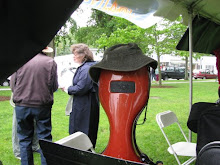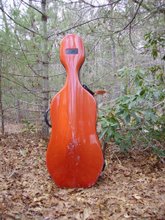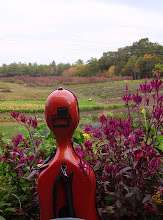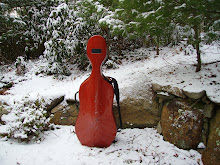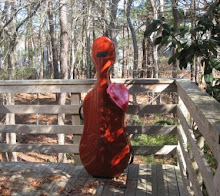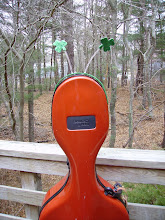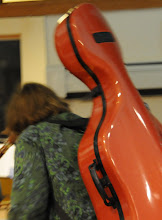The strings went off to practice "Adagio for Strings" last week, under the direction of the first violinist, rather than the conductor, who was spending the time rehearsing the wind instruments' solo piece, selections from Handel's "Water Music."
The grumbling began right away, the violins taking the lead. Well, there are far more violins than cellos, violas, and bass players. "Adagio for Strings" is a difficult piece, and we are not playing it well. We are having trouble with counting, fingerings, clef-reading, intonation, following the conductor, and staying together. We may simply not be at the level where we can handle this without better coaching. No one even mentioned bowings until last week, when I heard talk of "free bowing" from one of the violinists.
I laughed to myself, thinking it was a joke, but have since found out it is a real term. Wikipedia says it is "a performance technique used by a string section to create a fuller sound than can be achieved by synchronized bowing. Free bowing was popularized by Leopold Stokowski, who as conductor of the Philadelphia Orchestra experimented with many musical conventions....
"Under free bowing...the string members each determine
individually the best way to play a set of notes, collectively producing
a deeper sound, free of mechanical restriction. Free bowing is rarely
used today due to its lack of communal focus, which can cause musicians
to play out of step with each other. The Philadelphia Orchestra, with whom it was associated, discontinued the practice after Eugene Ormandy succeeded Stokowski as conductor."
I believe the violinist who suggested free bowing was not looking for a collectively deeper sound, but, rather, to eliminate bowing as one more thing we have to deal with. We are already using free bowing in this context. I don't know if audiences notice these things, but I am guessing our audiences would not. They are a kindly group.
We managed to get through the piece once during our rehearsal, in reasonable order, but no one is confident about their playing. It was suggested that we simply drop the piece from the concert program, rather than play something that will sound, ah, awful.
My immediate response was no, not yet. We still have three more rehearsals. I have spent most of my practice time, such as it is, on this piece! I am almost getting to the point where I can play it, though my consistency of counting in the long note section (whole notes, double whole notes) is still shakey.
The advantage of dropping the piece now is, of course, that it will give us more time to work on the other pieces. The disadvantage is that it could be that with a little more concerted effort we could actually do this. So my vote is to keep trying and drop it at the last minute, if need be.
Sunday, April 15, 2012
Thursday, April 5, 2012
Choosing or Being Chosen
"Did you choose the cello, or did the cello choose you?"
Not the usual question you expect from your cable guy. I was on the phone with him trying to get some help for our poor television reception. It was the second time in a couple of weeks that we had had a problem, and the first time what seemed to help was unplugging the cable box from one wall outlet and plugging it into another.
This time, my husband noticed when he got home from work that the television was unplugged. When he plugged it back in, the picture was poor, very snowy.
Perhaps because I had had such a fine conversation with the first cable guy, I explained that whole experience to the second cable guy, adding, in an uncharacteristically chatty way, that the television may have gotten unplugged as I stumble out the door with the cello on my back to go to orchestra. "It's a big instrument," I said, and sometimes I bump into things."
And, when I had replugged the cable box and TV, I had left them a little more vulnerable to bumping into.
He could not figure out what was wrong, and finally asked about the cello. He is a pianist, or in his words, plays around on the piano a bit. I never did get his full story on whether he chose the piano or whether it chose him, but I did relate to him some of the results of my daughter's Science Fair project of a few years back.
She was trying to find out if people who chose their own instrument, rather than had one chosen for them, were likely to continue to play longer. The study design was flawed (it included all those people who had to take up the recorder in third grade and dropped it immediately afterward), so I am not sure whether she proved her thesis or not, but one result was very clear: Many people do not choose their instruments.
A very successful saxophonist told us he took it up because there was one in the closet. Sometimes a band director would ask a student to play a particular instrument because the band needed it. Sometimes a mother decides for her children, based on her musical preferences or the logistics of carrying an instrument on the school bus. Or a child gives only superficial consideration: picking the flute because it is shiny or the trumpet because his friend chose the trumpet.
My answer to the cable guy was long-winded. I don't really know if I chose the cello. I was playing flute at the time, but was increasingly annoyed by the high notes. My flute teacher invited her adult students to play with the adult students of a local cello teacher and a violin teacher. I thought the cello really made the flute sound good. Someone gave me the [erroneous] impression that it was easy to play. Soon, I came to love it, even without the flute.
So, I don't really know. Maybe we chose each other.
P.S. The TV issue was not resolved on the phone, so a cable technician was sent to our house. He fixed the problem within 10 seconds of walking in. The television had been manually set to a channel other than 3 (probably when one of us turned off the TV manually; I can't blame this on a careening cello). He switched it back and left--without disclosing his musical inclinations.
Not the usual question you expect from your cable guy. I was on the phone with him trying to get some help for our poor television reception. It was the second time in a couple of weeks that we had had a problem, and the first time what seemed to help was unplugging the cable box from one wall outlet and plugging it into another.
This time, my husband noticed when he got home from work that the television was unplugged. When he plugged it back in, the picture was poor, very snowy.
Perhaps because I had had such a fine conversation with the first cable guy, I explained that whole experience to the second cable guy, adding, in an uncharacteristically chatty way, that the television may have gotten unplugged as I stumble out the door with the cello on my back to go to orchestra. "It's a big instrument," I said, and sometimes I bump into things."
And, when I had replugged the cable box and TV, I had left them a little more vulnerable to bumping into.
He could not figure out what was wrong, and finally asked about the cello. He is a pianist, or in his words, plays around on the piano a bit. I never did get his full story on whether he chose the piano or whether it chose him, but I did relate to him some of the results of my daughter's Science Fair project of a few years back.
She was trying to find out if people who chose their own instrument, rather than had one chosen for them, were likely to continue to play longer. The study design was flawed (it included all those people who had to take up the recorder in third grade and dropped it immediately afterward), so I am not sure whether she proved her thesis or not, but one result was very clear: Many people do not choose their instruments.
A very successful saxophonist told us he took it up because there was one in the closet. Sometimes a band director would ask a student to play a particular instrument because the band needed it. Sometimes a mother decides for her children, based on her musical preferences or the logistics of carrying an instrument on the school bus. Or a child gives only superficial consideration: picking the flute because it is shiny or the trumpet because his friend chose the trumpet.
My answer to the cable guy was long-winded. I don't really know if I chose the cello. I was playing flute at the time, but was increasingly annoyed by the high notes. My flute teacher invited her adult students to play with the adult students of a local cello teacher and a violin teacher. I thought the cello really made the flute sound good. Someone gave me the [erroneous] impression that it was easy to play. Soon, I came to love it, even without the flute.
So, I don't really know. Maybe we chose each other.
P.S. The TV issue was not resolved on the phone, so a cable technician was sent to our house. He fixed the problem within 10 seconds of walking in. The television had been manually set to a channel other than 3 (probably when one of us turned off the TV manually; I can't blame this on a careening cello). He switched it back and left--without disclosing his musical inclinations.
Subscribe to:
Posts (Atom)
